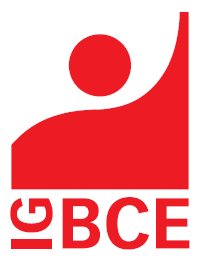Related Research Articles

Hoechst AG was a German chemicals, later life sciences, company that became Aventis Deutschland after its merger with France's Rhône-Poulenc S.A. in 1999. With the new company's 2004 merger with Sanofi-Synthélabo, it became a subsidiary of the resulting Sanofi-Aventis pharmaceuticals group.

The International Federation of Chemical, Energy, Mine and General Workers' Unions (ICEM) was a global union federation of trade unions. As of November 2007, ICEM represented 467 industrial trade unions in 132 countries, claiming a membership of over 20 million workers.

The IG Bergbau, Chemie, Energie is a trade union in Germany. It is one of eight industrial affiliations of the German Confederation of Trade Unions (DGB).

The Factory Workers' Union of Germany was a trade union in Germany.

The Trade Unions International of Chemical, Oil and Allied Workers was a trade union international affiliated with the World Federation of Trade Unions. It was often known by its French initials, ICPS.

Gabriele "Gabi" Weber is a German politician of the Social Democratic Party (SPD) who served as a member of the German Bundestag from 2013 until 2021.
The Union of Mining and Energy was a trade union in West Germany which existed from 1946 until 1997.
The Building and Construction Union was a trade union representing building workers in West Germany.
Karl Hauenschild was a German trade union leader and politician.
The Leather Union was a West German trade union representing workers in shoemaking, tanning, saddlery, and other work related to leather.

The German Agricultural Workers' Union was a trade union representing agricultural and forestry workers in Germany.
The Central Union of Glassworkers was a trade union representing people involved in manufacturing glass and glass objects in Germany.
The Union of Porcelain and Related Workers of Germany was a trade union representing workers in the ceramic industry in Germany.
The Industrial Union of Chemicals, Glass and Ceramics was a trade union representing workers in various industries in East Germany.
The Industrial Union of Printing and Paper was a trade union representing workers in the printing industry in East Germany.

The Italian Federation of Chemical and Allied Workers was a trade union representing chemical and some manufacturing workers in Italy.
The Industrial Workers' Union NVV was a general union focused on workers in heavy industry in the Netherlands.
General Union of Miscellaneous Industries was a general union in the Netherlands, focusing on manufacturing industries.
The Union of Textiles, Chemicals and Paper was a trade union representing workers in various industries in Switzerland.

Michael Zissis Vassiliadis is President of the Mining, Chemical and Energy Workers' Union in Germany and President of the European Confederation of Industrial Trade Unions IndustriAll Europe.
References
- 1 2 3 Markovits, Andrei (1986). The Politics of the West German Trade Unions. Cambridge: Cambridge University Press. pp. 267–326. ISBN 0521305136.
- ↑ "IG Chemie, IG Chemie, Glas und Keramik (1946-90)". FDGB-Lexikon. Friedrich Ebert Stiftung. Retrieved 10 July 2020.
- ↑ Ebbinghaus, Bernhard; Visser, Jelle (2000). Trade Unions in Western Europe Since 1945. Basingstoke: Palgrave Macmillan. p. 310. ISBN 0333771125.